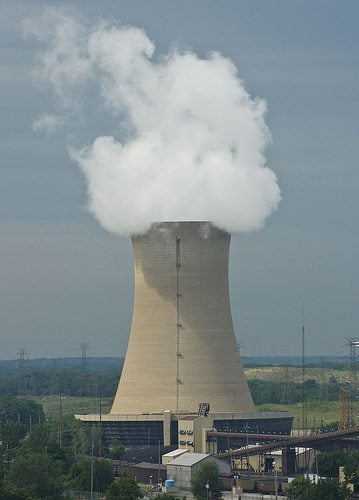

Energy
Nuclear power needed to tackle climate change, say leading scientists
Top conservation scientists have stated that in order to tackle climate change and protect the natural environment nuclear power must be considered. They warn that relying solely on renewables to replace fossil fuels is “risky”.
In an open letter over 70 scientists call on environmentalist and campaign groups to stop focussing on “idealistic perceptions of what is ‘green’” and instead look at the benefits of nuclear power generation.
Signatories state they support the broad conclusions of an article published in the journal Conservation Biology. The research states that the full range of electricity-generation sources, including nuclear power, must be deployed to replace the burning of fossil fuels if the world is to have a chance of mitigating severe climate change.
The scientists argue that renewables alone cannot provide a solution. This view has also been taken by two Google engineers who recently argued that today’s renewable technologies alone couldn’t cut greenhouse gas emissions enough to halt climate change.
The letter states, “Although renewable energy sources like wind and solar will likely make increasing contributions to future energy productions, these technology options face real-world problems of scalability, cost, material and land use, meaning that it is too risky to rely on them as the only alternatives to fossil fuels.”
Nuclear power has been a controversial issue and has often faced opposition from environmental groups. However, the scientists state that a combination of nuclear power, renewable generation, energy storage and energy efficiency could result in a cost-effective multi-pronged strategy that can deliver positive results.
The letter adds, “Given the historical antagonism towards nuclear energy amongst the environmental community, we accept that this stands as a controversial position.
“However, much as leading climate scientists have recently advocated the development of safe, next-generation nuclear energy system to combat global climate change, we entreat the conservation and environment community to weigh up the pros and cons of different energy sources using objective evidence and pragmatic trade-offs, rather than simply relying on idealistic perceptions of what is ‘green’.”
Signatories of the letter come from across the world, with a number coming from the UK, including Professor Lord Robert of the University of Oxford’s Department of Zoology, Professor Andrew Balmford from the Department of Zoology at the University of Cambridge, Dr Ben Collen from the Centre for Biodiversity and Environment Research at University College London, and from the University of Exeter, Professor Kevin Gaston, director of the Environment and Sustainability Institute.
Photo: Paul J Everett via Flickr
Further reading:
Japan steps closer to restarting nuclear power plants
UK wind farms better nuclear plants for 24 hours
European Commission approves subsidy plan for Hinkley Point C nuclear reactors
Environmentalists talk up nuclear power in Pandora’s Promise


 Features11 months ago
Features11 months agoEco-Friendly Cryptocurrencies: Sustainable Investment Choices

 Energy11 months ago
Energy11 months agoThe Growing Role of Solar Panels in Ireland’s Energy Future

 Energy10 months ago
Energy10 months agoGrowth of Solar Power in Dublin: A Sustainable Revolution

 Energy10 months ago
Energy10 months agoRenewable Energy Adoption Can Combat Climate Change



























